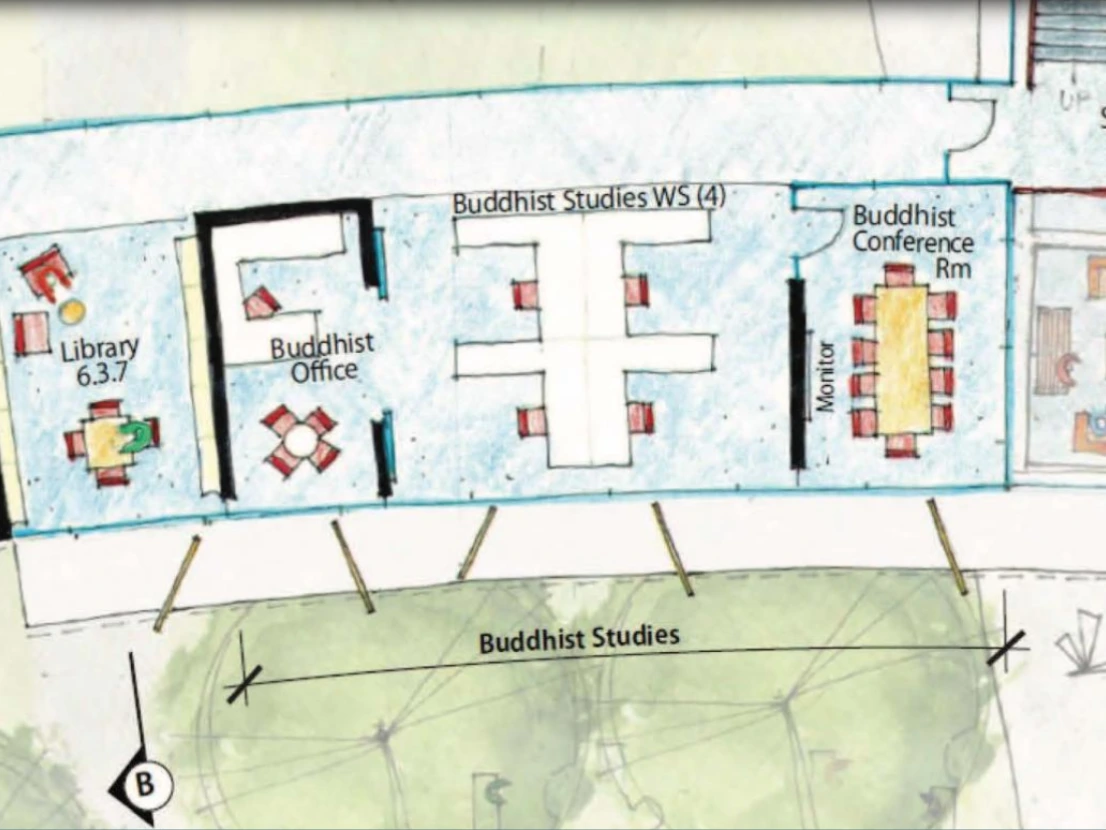
The University of Arizona Center for Buddhist Studies will have its new physical home in the Andrew Weil Center for Integrative Medicine, a landmark facility that will be dedicated to health and wellness.
The partnership is rooted in the complementary nature of the two Centers and will facilitate collaborations between the two programs. Like integrative medicine, Buddhist Studies takes a humanistic approach to the physical, mental, and spiritual well-being of individuals and the community.
“The study of Buddhism as both an ancient and evolving repository of knowledge is of great value in the work of improving people’s well-being. Working side by side, collaboration between the two Centers will enhance research outcomes and allow for the synthesis of Buddhist practices into health and wellness curriculum,” said Jiang Wu, Director of the Center for Buddhist Studies and a Professor of East Asian Studies.
The Andrew Weil Center for Integrative Medicine’s new custom-designed facility will bring together the concepts and philosophies upon which Integrative Medicine is built and provide space for teaching, research and community engagement. Inviting the Center for Buddhist Studies to share the space was a natural fit, Weil said.
“We believe that the built environment is an essential component of integrative health, central to disease prevention and health promotion. Our research has proven that the design of the office environment can affect people’s stress and activity levels, their posture, even their sleep quality,” Weil said. “This custom-designed facility brings together the concepts and philosophies upon which Integrative Medicine is built and including the Center for Buddhist Studies is a crucial element in promoting health of the mind and spirit as well as body.”
The Center for Buddhist Studies will have a suite in this innovative building that will be uniquely suited to its mission and needs. In addition to research space, the suite will provide library space for display and access to the impressive Maitreya Library of Buddhist Canon, a conference room, and a unique tea ceremony space. This new home will enable the Center to host visiting scholars, international conferences and community lecture series. A fundraising campaign is underway, including a naming opportunity.
Upon completion of this project, the University of Arizona Center for Buddhist Studies will be the largest center of its kind, in terms of physical space, anywhere outside of Asia.
“We are thrilled to begin this collaboration and thankful to Dr. Weil and his staff for the invitation to share this exciting journey. This new, custom-designed facility will dramatically increase our capacity for research and engagement and make the University of Arizona an international destination for not only integrative medicine, but Buddhist studies as well,” Wu said.
College of Humanities Dean Alain-Philippe Durand expressed his gratitude to Dr. Weil and Dr. Victoria Maizes for their invitation. Durand is both honored and excited about this new collaboration and said the new facility will add to the already impressive international reputation of the Center for Buddhist Studies.
“The world-renowned expertise of our faculty members has created an exceptional foundation for this Center and this new facility and collaboration will greatly enhance the Center’s potential for outreach to visiting Buddhist Studies scholars, health and wellness experts and the general public,” Durand said.
Maizes, AWCIM Executive Director, also anticipates that the programs working alongside one another will create new opportunities for collaboration in research and education.
“The partnership between the AWCIM and the Center for Buddhist Studies is a great example of the way that programs can amplify one another’s work. Similar to integrative medicine, Buddhist Studies takes a humanistic approach to the physical, mental, and spiritual well-being of individuals and the community,” Maizes said.
“The general public’s understanding of health and well-being has shifted significantly since the Center for Integrative Medicine was founded in 1994, in large part because of Andrew Weil’s vision and the Center’s extensive training programs in integrative medicine, which embrace Eastern philosophies and practices,” said Dr. Esther M. Sternberg, Research Director of the Andrew Weil Center for Integrative Medicine.
“Our research program’s focus on the importance of place and the physical environment in integrative health has added to that vision and is completely in line with Eastern understandings of space. This new facility’s innovative design will embody that sensitivity. Promoting healing-oriented medicine that takes account of space and its impact on the whole person makes the Center for Buddhist Studies a natural partner,” she said.
The content is forwarded from the following link: https://humanities.arizona.edu/news/buddhist-studies-preparing-new-home-weil-center OCTOBER 9TH, 2020

